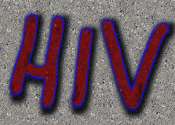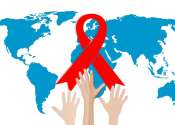Last update:
HIV & AIDS news
HIV & AIDS
Pepfar funding to fight HIV/AIDS has saved 26 million lives since 2003: how cutting it will hurt Africa
The US President's Emergency Plan for AIDS Relief has been a cornerstone of global HIV/AIDS prevention, care and treatment for over two decades. Pepfar has enjoyed broad bipartisan support in the US, but its future is now ...
Mar 4, 2025
0
0
HIV & AIDS
Health risks in people with HIV still possible despite successful therapy, study shows
A new study reveals that a significant proportion of people living with HIV (PWH) on long-term antiretroviral therapy remain at risk of immune and metabolic complications despite successful viral suppression. The findings ...
Feb 28, 2025
1
33
Scientists discover the function of a mysterious HIV component
Researchers from the Max Planck Institute of Biochemistry have discovered the mechanism behind an important step in the life cycle of HIV. Working together with teams at Heidelberg and Yale Universities, they found that the ...
Feb 27, 2025
0
44

HIV stigma tied to moral judgments, complicating destigmatization efforts
Persistence of stigma toward people living with HIV has puzzled scientists looking at the numerous destigmatization campaigns that have taken place in the U.S. in the four decades since its initial discovery. Scientists have ...
Feb 21, 2025
0
0

New paper-based device boosts HIV test accuracy from dried blood samples
In parts of the world where traveling to a clinic for routine blood tests is a financial and logistical challenge, HIV patients increasingly have the option to collect and ship a drop of their blood in paper-based devices ...
Feb 19, 2025
0
43

Drug therapy lenacapavir may effectively control HIV in Uganda
A multi-national, multi-institutional study led by Weill Cornell Medicine investigators found little natural resistance to a new HIV therapy called lenacapavir in a population of patients in Uganda.
Feb 19, 2025
0
0

Transforming HIV diagnosis: A low-cost, point-of-care detection solution
A team of researchers from the University of Florida has developed an innovative handheld device for human immunodeficiency virus (HIV) detection that combines paper-based sample preparation with real-time isothermal amplification. ...
Feb 19, 2025
1
0

Methadone treatment shown to improve HIV care for formerly incarcerated individuals
When transitioning from prison to the community, formerly incarcerated individuals face numerous challenges, including lack of employment, housing, and health care. This transition is more precarious for those with HIV or ...
Feb 19, 2025
0
0

Scientists develop new natural killer cell strategy to target HIV
Researchers at The Wistar Institute's HIV Cure and Viral Diseases Center have successfully identified a new approach using natural killer (NK) cells to target and kill the HIV-positive cells that allow the virus to persist. ...
Feb 18, 2025
0
29

HIV protein switch may help virus squeeze into host cell nucleus
Supercomputer simulations have revealed how changes in the shape of the HIV-1 capsid protein may help the virus squeeze its inner core into the host cell's nuclear membrane. The findings, by a University of Pittsburgh team ...
Feb 18, 2025
0
38

Researchers look for the best ways to help people with HIV quit smoking
Human immunodeficiency virus (HIV) treatment has gotten so good that people can take a pill once a day to achieve viral suppression that lets them live much longer than anyone could have imagined just a few decades ago.
Feb 18, 2025
0
0

Q&A: Researchers discuss stigma, unequal access and aging population, all challenges to HIV care and prevention
Despite breakthroughs in HIV treatment and prevention worldwide, critical challenges such as stigma, unequal access and managing the virus for an aging population remain, a group of Rutgers Health experts said at a recent ...
Feb 17, 2025
0
0

This is what happens to the body when HIV drugs are stopped for millions of people
A generation has passed since the world saw the peak in AIDS-related deaths. Those deaths—agonizing, from diseases or infections the body might otherwise fight off—sent loved ones into the streets, pressuring governments ...
Feb 13, 2025
0
0

Trump White House's disengagement from HIV/AIDS response could have lethal consequences
With the endless stream of announcements, reversals, measures and countermeasures coming from the new administration of United States President Donald Trump, it has become difficult to make sense of what is just noise or ...
Feb 12, 2025
0
0

Biden rule cleared hurdles to lifesaving HIV drug, but in Georgia barriers remain
Preexposure prophylaxis, known as PrEP, reduces the risk of new HIV infections through sex by 99% and among injectable drug users by at least 74%, according to the Centers for Disease Control and Prevention.
Feb 11, 2025
0
0

HIV infections could jump over 6 times if US support is dropped and not replaced, UNAIDS chief says
The head of the U.N. AIDS agency said Monday the number of new HIV infections could jump more than six times by 2029 if American support of the biggest AIDS program is dropped, warning that millions of people could die and ...
Feb 10, 2025
0
0

Fiji's HIV crisis is a regional challenge that demands a regional response
In the words of UNAIDS Asia Pacific Regional Director Eamonn Murphy, rising HIV infections in Fiji "put the entire Pacific region at risk."
Feb 4, 2025
0
0

Mapping HIV-linked infections unearths diagnosis 'blank spots' in Africa
A map of deadly infectious diseases known to attack the central nervous system (CNS) of people who are already suffering with HIV has unearthed diagnosis "blank spots" in Africa, according to research published today in The ...
Jan 30, 2025
0
2

Trump administration waives halt on distribution of HIV medications via PEPFAR
The Trump administration has made some concessions to the halt placed on distributions of global HIV treatments via the U.S. President's Emergency Plan for AIDS Relief (PEPFAR), according to The New York Times.
Jan 30, 2025
0
0

WHO urges US to maintain support for HIV treatment programs
The World Health Organization on Tuesday urged the United States to reconsider its decision to suspend funding for HIV treatment programs in developing countries, after President Donald Trump ordered a freeze on foreign aid.
Jan 29, 2025
0
0

Cancer-fighting compound shows immense potential to eradicate HIV
A compound with the unpresuming designation of EBC-46 has made a splash in recent years for its cancer-fighting prowess. Now a new study led by Stanford researchers has revealed that EBC-46 also shows immense potential for ...
Jan 27, 2025
0
47

Trump pauses disbursement of global HIV treatment funds
The Trump administration has paused funding for a crucial HIV treatment program in Africa and developing countries for 90 days, according to a memo obtained by The New York Times.
Jan 27, 2025
0
2

Social programs could cut HIV spread by 29%, study finds
Researchers at the University of Massachusetts Amherst have quantified the impacts of a constellation of social factors on the spread of HIV. Their study, published in Health Care Management Science, found that a hypothetical ...
Jan 22, 2025
0
0

Global study: HIV patients face underestimated heart disease risks
Cardiovascular disease (CVD) is the leading cause of morbidity and mortality globally, posing a particularly significant threat to people with HIV (PWH). To address this, CVD prevention plans rely on prediction models like ...
Jan 18, 2025
0
2

A chain reaction: HIV vaccines can lead to antibodies against antibodies
Many vaccines work by introducing a protein to the body that resembles part of a virus. Ideally, the immune system will produce long-lasting antibodies recognizing that specific virus, thereby providing protection.
Jan 17, 2025
0
58





































